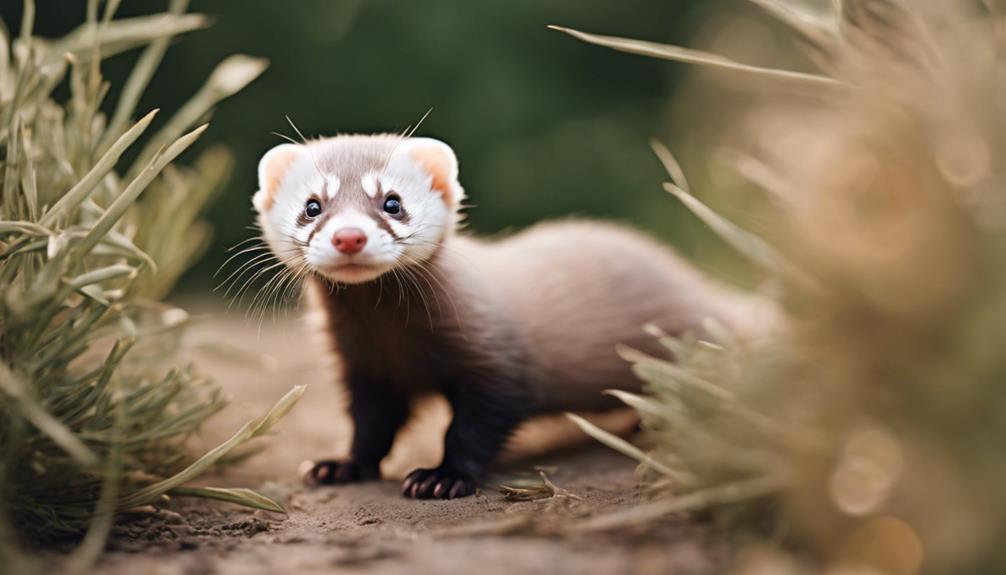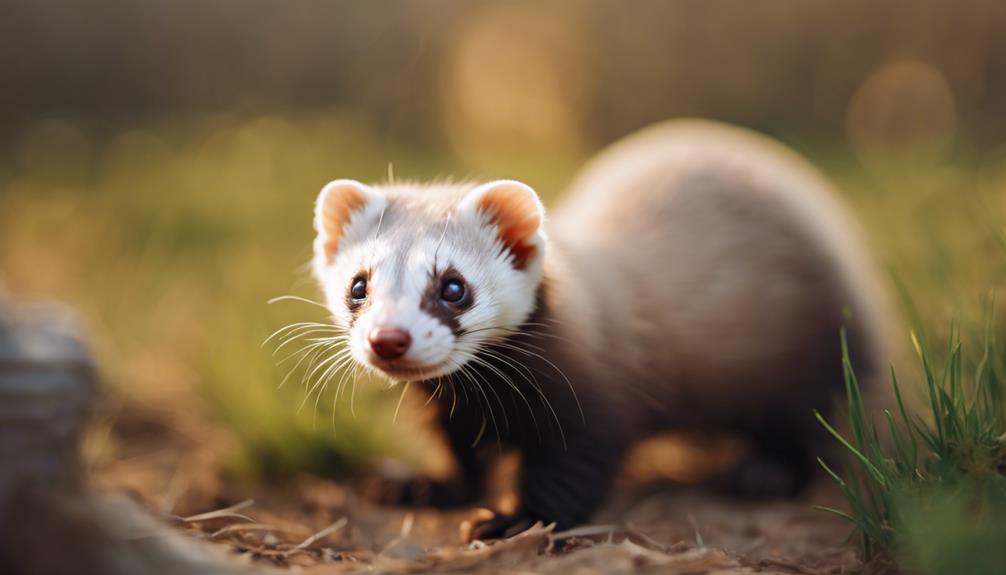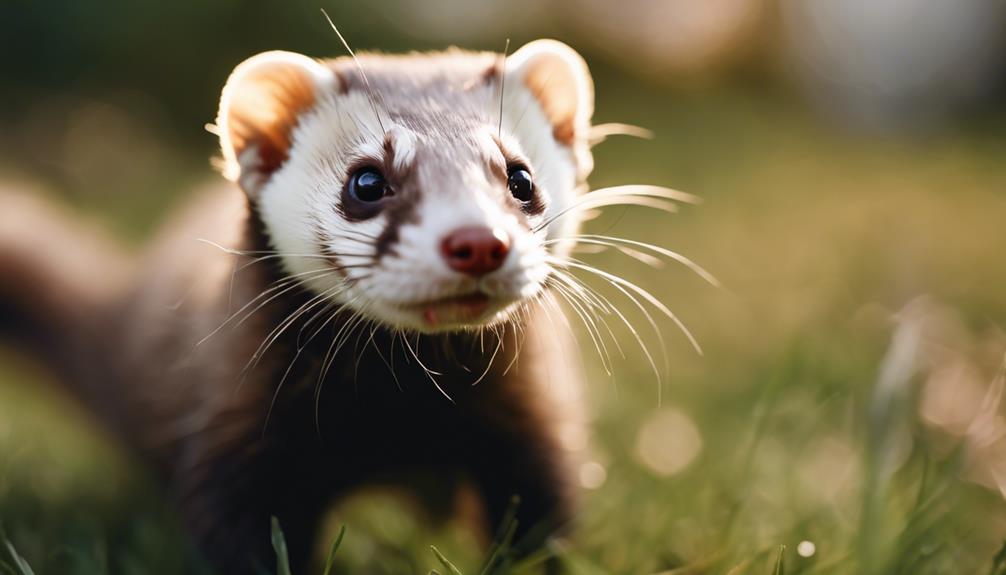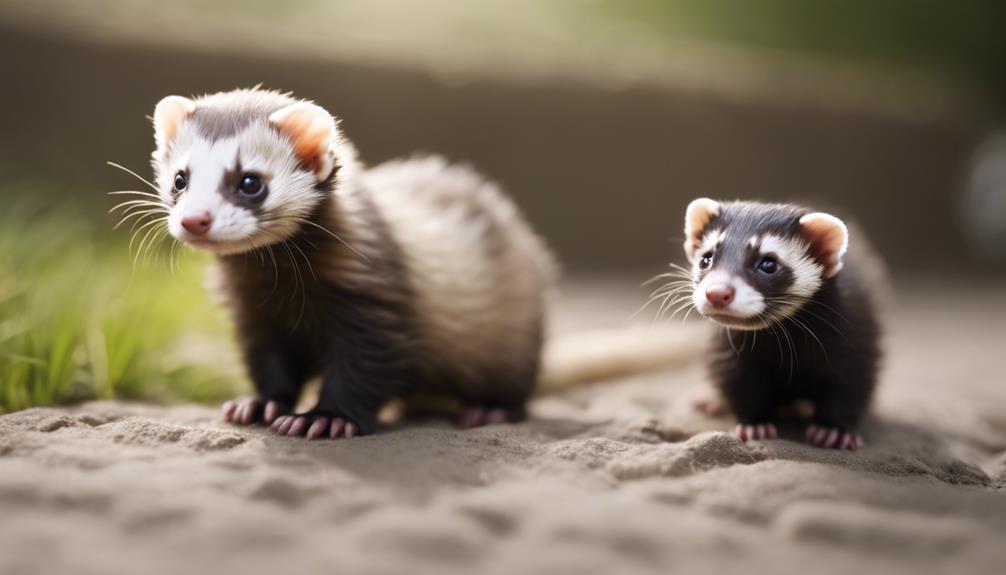When Do Ferrets Reach Their Full Size and Maturity?

They are known for their playful and curious nature, making them popular pets.
Ferrets are social animals that enjoy the company of their human owners.
They require a diet high in protein and fat to stay healthy.
Growth Phases of a Ferret
Have you ever wondered how ferrets grow from tiny babies to full-grown adults? Let’s explore the fascinating journey of a ferret’s growth stages together!
Dietary Needs:
- Ferrets are picky eaters! They need a diet full of meat and fat to stay healthy.
- Good quality ferret food or a raw diet that imitates their natural prey is key.
- Don’t forget to keep fresh water available all the time to keep them hydrated.
Health Concerns:
- Ferrets can get sick too! They might face issues like adrenal disease, insulinoma, and tummy troubles.
- Regular visits to the vet, a balanced diet, and a clean home can help keep them healthy.
- Knowing the signs of common ferret illnesses is crucial to get them help early.
Overall Well-being:
- Taking care of a ferret means giving them the right food and seeing the vet regularly.
- By looking after their nutrition and health, you can help your ferret grow happily into a strong adult.
Ferrets are unique little creatures that need special care to thrive. With the right knowledge and love, you can guide them through each growth phase towards a healthy and happy life.
Birth to 3 Months

During the first three months of a ferret’s life, it undergoes rapid growth and development. This period is crucial for reaching various developmental milestones that set the foundation for its future behavior and size.
Understanding the early growth stages of a ferret can provide valuable insights into its overall well-being and care requirements.
Early Growth Stages
Ferret Growth 101: What You Need to Know!
Hey there, future ferret enthusiasts! Did you know that the first three months of a ferret’s life are super important for their growth and health? Let’s dive into some key things to keep in mind during this crucial period:
- Feeding Frenzy: Ferrets need a diet packed with top-notch protein to grow up strong and healthy.
- Health Check-Ups: Regular visits to the vet are a must to make sure your fuzzy friend is feeling their best.
- Social Butterfly: Time to mingle! Interacting with humans and other ferrets helps them become social pros.
- Training Time: Teach them the ropes early on, like using a litter box. Good habits start now!
Development Milestones
Are you curious about how ferrets grow and develop in their early months? Let’s explore the key milestones that shape their future well-being and behavior:
- Nutrition: Did you know that ferret kits need a diet rich in protein and fat to grow healthy and strong? It’s like their super fuel for rapid development!
- Socialization: Just like making friends is important for us, ferrets also need to socialize to become well-adjusted adults. Introducing them to new places and experiences, along with gentle handling, helps them feel comfortable in different situations.
- Training: Have you heard of reward-based training? It’s a fun way to teach ferrets good habits from a young age. Positive reinforcement goes a long way!
- Health Monitoring: Keeping an eye on their health is crucial during this critical time. Checking for parasites or genetic conditions ensures they stay happy and healthy as they grow.
Size and Behavior
The Exciting Growth and Development of Young Ferrets!
Hey there, curious minds! Have you ever wondered how ferret kits grow and change in their first three months of life? Let’s dive into the fascinating world of young ferrets!
Size Differences:
- Did you know that ferret kits double in size within just a few weeks? That’s some speedy growth!
Behavioral Changes:
- When they’re born, ferret kits rely heavily on their mom, but as they grow, they start exploring their surroundings all on their own.
Growth Patterns:
- Imagine watching their bodies elongate and witnessing the start of their unique adult fur patterns. It’s like watching a beautiful transformation!
Temperament Shifts:
- As ferret kits grow, they become more playful and curious. These little bundles of energy are just starting to show their true colors!
It’s truly amazing to see how much young ferrets change and develop in such a short time. Keep an eye on these little adventurers as they grow into their lively and inquisitive selves!
3 to 6 Months

Ferrets at 6 Months: Growing Up Healthy and Strong!
Hey there, ferret enthusiasts! Have you ever wondered what happens when your furry friend reaches 6 months of age? Let’s dive into the exciting world of young ferrets and how to take care of them as they grow up.
What to Expect at 6 Months:
- By the time ferrets hit 6 months, they’re pretty much fully grown and mature.
- It’s essential to focus on their diet and exercise routine to keep them healthy and happy.
Diet Tips for Young Ferrets:
- A balanced diet is crucial for their growth and development.
- Make sure they get all the necessary nutrients for their well-being.
- Consider high-quality ferret food to meet their nutritional needs.
Exercise for Physical and Mental Health:
- Providing opportunities for play and exploration is key.
- Exercise keeps them fit and mentally stimulated.
- Interactive toys and playtime are great for their overall well-being.
Health Care for Growing Ferrets:
- Regular vet check-ups are important to monitor their health.
- Vaccinations are essential to prevent illnesses.
- Early detection of health issues leads to better outcomes.
Taking care of your young ferret as they reach 6 months is a rewarding experience. By focusing on their diet, exercise, and health needs, you can ensure they lead a happy and healthy life. Stay informed, stay engaged, and enjoy the journey with your furry companion!
6 to 9 Months

Ferrets at 9 Months: What to Expect
Hey there, curious ferret enthusiasts! Wondering what’s up with your furry friend at 9 months old? Let’s dive into the exciting world of ferret growth and development!
- Size Check: At 9 months, your ferret is almost at their full-grown size. Males typically weigh between 2.5 to 4.5 pounds, while females range from 1 to 2.5 pounds. They might still grow a bit more, but they’re mostly there!
- Adulting Ferrets: By 9 months, your ferret is a young adult, all grown up in behavior and body. They’re calmer and less hyper than when they were younger. It’s like they’ve graduated to the next level of ferret life!
- Shiny Coats: Your ferret’s coat should be looking top-notch at 9 months – smooth, glossy, and all-around fabulous. If you notice any changes in their coat after this point, it could signal health issues.
- Muscle Power: At 9 months, your ferret has built up some serious muscle strength. This is key for their agility and playfulness. Keep them active with fun exercises and a balanced diet to keep those muscles in top shape!
9 to 12 Months

Ferrets typically continue to experience a steady growth rate between 9 to 12 months of age. During this phase, distinct physical changes can be observed in their size, weight, and coat quality, which are key indicators of their maturation process.
Additionally, behavior development milestones become more pronounced as ferrets approach the one-year mark, reflecting their transition to full maturity.
Growth Rate Comparison
Unlocking the Mystery of Ferret Growth
Have you ever wondered how fast ferrets grow in their first year? Let’s explore the fascinating world of ferret growth together!
- Boys vs. Girls: Did you know that male ferrets are usually a bit bigger than females when they turn 1 year old? It’s interesting how nature works its magic!
- Different Breeds, Different Speeds: Just like how some people grow taller quicker than others, certain ferret breeds may grow faster too. This can make them end up varying in size by the time they hit their 1st birthday.
- Food Matters: Eating right is super important for ferrets to grow properly. A balanced diet filled with all the necessary nutrients can help them reach their full size on time. It’s like giving them the perfect fuel for their growth journey!
- Home Sweet Home: Where a ferret lives and how much they move around can also impact how fast they grow. A cozy and active environment can help them reach their full potential.
Understanding these cool facts can help you ensure your ferret grows up healthy and happy!
Physical Changes Observed
Growing Up Ferrets: What to Expect in the First Year
Hey there, ferret fans! Ever wondered how your furry friend grows and changes during their first year? Let’s dive into the exciting world of ferret development!
1. Weighty Matters:
- Ferrets pack on the pounds as they grow, especially in their first 12 months.
- Males tend to be bigger than females, so don’t be surprised if your boy gets a bit chunkier!
2. Fur-tastic Transformations:
- Notice any changes in your ferret’s coat? That’s totally normal!
- As they mature, their fur may shift in texture, color, and thickness – it’s like a fashion makeover for your ferret!
3. The Big Picture:
- Watching these physical changes is like keeping an eye on a living, breathing growth chart for your pet.
- By paying attention to these shifts, you can make sure your ferret is happy, healthy, and reaching their full potential.
Stay tuned for more fun facts about your ferret’s growth journey. Remember, every whisker and wiggle tells a story of their development!
Behavior Development Milestones
Unleashing the Wonders of Ferret Behavior Growth!
Hey there, curious minds! Did you know that as ferrets grow up in their first year, they go through exciting changes in their behavior? Let’s dive into the fascinating world of ferret development up to 12 months of age!
- Making Friends: Ferrets are learning how to socialize with people and other furry pals. It’s like they’re attending a school for social skills!
- Playtime Fun: Play is super important for ferrets. It’s not just fun and games; it helps them stay healthy and sharp in mind!
- Training Tips: Teaching your ferret simple tricks is a great way to encourage good behavior and steer them away from the naughty stuff.
- BFF Bonding: Spending quality time with your ferret through play and gentle cuddles strengthens the special bond between you two. It’s like creating a forever friendship!
These milestones are like stepping stones to help ferrets grow into happy and healthy adults. How cool is that?
1 to 2 Years

Are you curious about how ferrets grow and stay healthy? Let’s explore the fascinating world of young ferrets and what they need to thrive!
♀️ How do ferrets develop?
- Ferrets usually reach their full size and maturity by the age of two years.
- During this time, it’s important to provide them with the right nutrition to support their growth and health.
♀️ What do ferrets eat?
- Ferrets have high metabolic rates and specific dietary requirements.
- They need a diet rich in animal proteins and fats to stay healthy.
♀️ Why is exercise important for young ferrets?
- Ferrets are super active animals and need lots of physical activity to stay healthy.
- Providing them with a fun environment, including toys and playtime, can keep them happy and fit.
Adult Ferret Size and Maturity

When do adult ferrets reach their full size and maturity?
Hey there! Ever wondered when your furry friend will reach their full size and maturity? Well, adult ferrets typically hit their full size and maturity between 1 to 2 years old.
Here are some important things to keep in mind to ensure your adult ferret stays happy and healthy:
- Eating Right and Staying Active: Just like us, ferrets need a balanced diet to stay in top shape. Make sure they get high-quality food rich in protein and fats. And don’t forget to let them run around and play to keep those energy levels up!
- Check-Ups Are Key: Regular visits to the vet are crucial for keeping tabs on your ferret’s health. Vets can help with vaccinations, preventing parasites, dental care, and overall well-being.
- Cleanliness Is Next to Ferretliness: It’s essential to keep your ferret’s living area clean and tidy. This helps prevent illnesses and creates a healthy space for your pet to thrive.
- Keep Them Sharp: Stimulating your ferret’s mind is just as important as keeping their body active. Interactive toys and playtime can ward off boredom and keep your ferret mentally healthy.
Frequently Asked Questions
Are Male and Female Ferrets the Same Size When Fully Grown?
Male and female ferrets typically exhibit size differences when fully grown. These variations are influenced by gender variations in growth patterns. Additionally, behavior changes may also be observed as ferrets reach maturity, reflecting their distinct gender characteristics.
Do Ferrets Continue to Grow in Size After Reaching Maturity?
Ferrets may continue to grow slightly in size after reaching maturity. Growth patterns can vary based on genetics, hormonal changes, and environment. While most reach their full size around 1 year, some may experience gradual changes.
Can the Diet of a Ferret Affect Their Growth and Size?
A ferret’s diet can significantly impact their growth rate and size. Proper protein intake supports healthy development, while exercise helps regulate metabolism. Monitoring these factors can ensure a ferret reaches its full size and maturity effectively.
Are There Any Health Conditions That Can Affect the Growth and Maturity of a Ferret?
Genetic factors, nutritional requirements, environmental influences, and exercise needs can impact a ferret’s growth and maturity. Health conditions like adrenal disease, insulinoma, and heart disease may affect their development. Regular vet check-ups are essential.
How Can I Tell if My Ferret Is Under or Over-Sized for Their Age and Breed?
Weight monitoring is key to assessing a ferret’s size. Growth patterns should align with breeding standards. Size comparisons with others of the same breed are helpful. If a ferret appears under or over-sized, consult a veterinarian for guidance.











